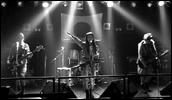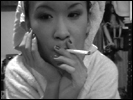The New God
- Year
- 1999
- Original title
- Atarashii Kamisama
- Japanese title
- 新しい神様
- Director
- Cast
- Running time
- 99 minutes
- Published
- 9 September 2002



by Jasper Sharp
"Tora, Tora, Tora! Pearl Harbour was our only choice. Our race was corrupted from the day we lost the war..." Karin Amamiya, lead singer of ultra-nationalist hardcore punk band The Revolutionary Truth looms centre stage, barking out aggressive but heartfelt anti-American sentiments to a dwindling audience.
Troubled music for troubled times, one might think, though on the surface at least, there seems to be little immediate to worry about for the citizens of modern day Japan, currently one of the safest places on the planet. However, in recent times, and especially since the death of Emperor Hirohito marked the end of the Showa Period in 1989, the Heisei Period has seen a marked revival in the nationalist movement.
Nationalism, with its indelible associations of racism and the military right wing is a fairly dirty word to most people, and a subject which most would prefer to waft aside without giving a second thought. But for documentary maker Yutaka Tsuchiya, who stood amongst the cowed observers at the gig with which the film opens and viewing the proceedings firmly from the other side of the political fence, there's something more heartfelt about Amamiya's plea. "I shivered. I don't know why. I felt her pain, somehow, like a reflected light beam stabbing the heart."
The New God documents Tsuchiya's attempts to delve beyond the political rhetoric and intimidating facade of the fascinatingly complex figures of Amamiya and guitarist/band-leader Hidehito Itoh of The Revolutionary Truth, in the process discovering that all three of them have a lot more in common than their seemingly diametrically opposed standpoints might first lead one to believe. Handing Amamiya a DV-camera in which to film herself in a series of talking head shots, over the course of little over a month, he manages to get a whole lot more than he initially bargained for...
At the beginning of the film, Amamiya is beginning to question her own beliefs in Right Wing Nationalism after a trip to Pyongyang in North Korea at the invitation of The Japanese Red Army to see the effect of communism on the daily lives of its citizens. At first she is welcomed with open arms by her compatriots, seemingly unworried by their opposing political beliefs. As someone points out, "Left or right is just a label for someone caring about their race. Anti-imperial America is what we agree on."
However, once the drinking stops and the politicising begins, she confides to her camera in the privacy of her hotel room that her own views might be causing some problem with the older activists. "I'm not sure you really understand Japan", one of the communists tells her after being shown a video of one of The Revolutionary Truth's concerts, to which Amamiya concurs with a rather meek "hai".
Nevertheless, she is markedly struck by the way that the North Koreans are bound together by a common value system "Words such as solidarity touched my heart as a nationalist". In contrast, she sees the only shared values the Japanese possess is via consumerism and value systems imposed from outside. "The Japanese can't make friends. Only cut their wrists and call sex lines."
It is statements such as these that throw light on where Amamiya is coming from in her politics. At numerous points in the film she confesses that a troubled upbringing and 9 years of bullying at the hands of her school classmates left her feeling an outsider. Nationalism provided a channel for her feelings of ostracism and self-loathing. Similarly, in an unguarded moment, Itoh confesses he embraced nationalism to stop being a nerd. "When did you force these two ideas, 'to stop being a nerd', and 'anti-America' together?", asks Tsuchiya. "Well, after joining the Nationalists, actually", Itoh capitulates.
With such moments of honesty, both Amamiya and Itoh cease to become threatening political extremists and start really developing as fully rounded and sympathetic characters, plagued by self-doubt and fully aware of their irreconcilable idealism. It's an angle which Tsuchiya pursues admirably as he becomes closer to the two band members, turning the film into a three-way dialogue between the film maker and his subjects. "I know what she means. Something has created an emptiness covering Japan. To her it's America, to me it's the emperor system", he muses between scenes.
Both Itoh and Amamiya's viewpoint is that the modern Japanese, dulled by the "suffocating peace" of the Heisei (literally meaning 'attainment of peace') period have forgotten their roots and are content to remains as "America's fat dog", and that as a result Japan has lost any significance in world politics. They argue that the deaths of Japanese soldiers during the Pacific War should not be forgotten as they were acting in the interests of the emperor at a time when every man and woman worked their life for the country. In a nutshell, to deny your nation's history is to deny your national identity, especially in such a culturally and racially heterogeneous society "where it's easy to fake national and racial identity".
Whilst Itoh and Amimaya's desire for a return to the 'Nation as Family' rather than America's hollow individualism might merely be seen as wilful nostalgia, the underlying desire for a shared value system and common identity is perhaps not so outrageous: "The emperor is the moral, not the system", as Itoh says. Translating these wishes into a political agenda is however slightly more problematic. As Tsuchiya points out, his problem with nationalist politics is that it excludes non-nationals, a factor which Amamiya admits had always bothered her about the right wing Nationalist Party of which the two musicians are active members.
It is really after her return from North Korea that sees Amamiya's growing disillusionment with political process, sparked off by the lacklustre reception of her talk on her pilgrimage at a meeting of a neo-right wing group, who'd rather revel in drunken rhetoric and "jabber in their cups to feel their camaraderie". Itoh's street-level activism, yelling "You fuckers are all just lifestock!" down a megaphone to indifferent passers-by doesn't seem to be much more effective either.
In true Spinal Tap form, Tsuchiya's presence seems to act as a catalyst for problems already latent within the band, and so a new "liberal" guitarist is drafted in to ease the tension. Umitaro Tanaka is the 'Lukewarm Water' role between Amamiya's 'Fire' and Itoh's 'Ice'. "Singing the national anthem before the gig just isn't my thing" he mumbles during a band practice session. After meeting hostile receptions from audiences and being kicked out of a series of venues, one begins to wonder whether it is perhaps the medium rather than the message that is the problem.
Of course, it is Amamiya's presence that fuels the whole endeavour, invoking a fair degree of sexual tension between the two males as we see her being drawn away from Itoh's radical polemic to the film-maker's more liberal suave. We see Itoh yawning and nodding off when excluded from a heated drunken political discussion between Amamiya and her new hero figure in a bar. Later Amamiya bounces up and down appreciatively gushing "Kakkoii!" ("Cool!") as Tsuchiya nonchalantly sums up his political stance; "All I know is that my work says it all". When Itoh tries to get in on the act shouting "Yes, it's great to be creative, isn't it!", he is silenced by a condescending "Go and bake a cake then!" from Amamiya.
Both entertaining and thought-provoking, not to mention frequently incredibly funny, the transformation of The Revolutionary Truth's stance via its rejection of both hard line right-wing and left-wing politics to a more comfortable form of nationalism is absolutely riveting from start to finish. At a time when the old political arguments are ceasing to have any relevance, Tsuchiya introduces us to two absolutely remarkable characters whom we might otherwise dismiss completely out of hand, as he reminds us that, whether left or right, politics at the end of the day is about people. All hail The New God.